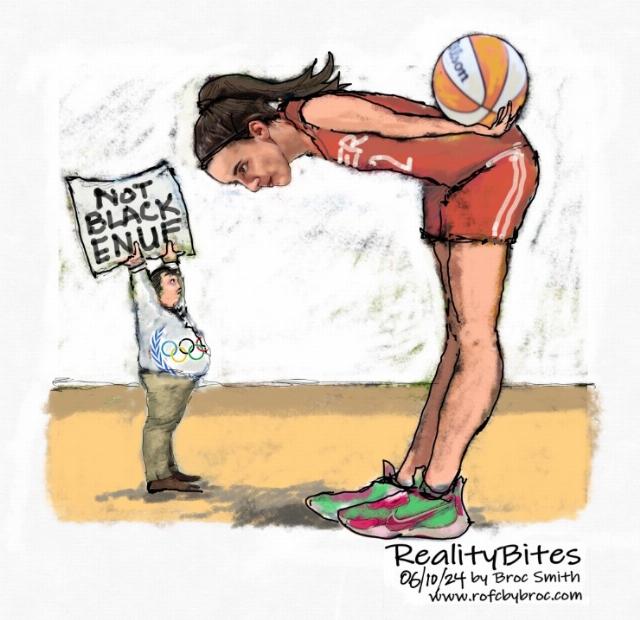Caitlin Clark and the Psychology of Racial Hatred
It’s not hard to understand why Caitlin Clark, the record-setting white ex-NCAA women’s basketball standout, is enjoying attention and endorsements like no WNBA player before her. And, no, it’s not because of (mythical) “white privilege.”
It’s just as how Tiger Woods -- who brought legions of new fans to golf the way Clark is doing for women’s hoops -- was treated like royalty in the late ’90s for being the first dominant “black” (he calls himself “Cablinansian”) golfer. It’s just as how Danica Patrick became the golden girl of auto racing, even though she was perhaps best known for crashing, because she was a woman in a man’s arena. It’s just as how Gerry Cooney was much ballyhooed in the early ’80s for being a “great white hope” in heavyweight boxing, a category where for decades the champion had almost always been black.
It’s called novelty.
Clark is a white gal, after all, in a league 63 to 80 percent black. There’s another factor, too: People expect the best basketball players to be black. This makes Clark akin to an underdog (that is, in a sense), and people tend to root for underdogs.
Add to this that she’s the “girl next door,” with an impressive college GPA, pleasant demeanor and some obvious intelligence, and she’s a sponsor’s dream. She’s decidedly not a thug in a league in which, sadly, thuggish behavior is too common. (Take note of this, WNBA ladies: You are a product. Making yourself more unattractive makes you less marketable. Oh, and this Captain Obvious economics lesson is free of charge.)
None of this matters to the Caitlin Clark Hate Brigade, though. Some WNBA players and certain fans are livid and insanely jealous that she’s garnering perhaps unprecedented fame and endorsement money. This isn’t surprising. Women are known for being envious -- especially of other women. And when that intense jealousy and other negative emotions kick in, they may try to viciously destroy the object of their wrath (seemingly oblivious, in this case, to the fact that this may destroy the Clark-enabled future prospects of their welfare-case league. I call it that because the WNBA survives off NBA-provided subsidies.) Yet in certain cases -- just some -- there’s surely also a deeper, psychological reason for the Clark hatred.
It’s no secret that many American blacks are intensely racially oriented, exhibiting great racial patriotism and often deriving self-esteem from the idea that they’re part of a special group. To such people, these group-focused individuals, everything is about group competition. And deriving positive self-image from group membership means maintaining the idea that the group is special, if not superior.
 This leads to much self-delusion. Why, the black people in question will go so far as to claim that figures such as Cleopatra (I addressed her case here) were black and that even some British kings were. They often, in fact, create a whole alternative history in which black societies were the very cradle of civilization, the true progenitors of modernity itself, a status only lost because their glories were stolen from them.
This leads to much self-delusion. Why, the black people in question will go so far as to claim that figures such as Cleopatra (I addressed her case here) were black and that even some British kings were. They often, in fact, create a whole alternative history in which black societies were the very cradle of civilization, the true progenitors of modernity itself, a status only lost because their glories were stolen from them.
Put differently, there’s little to no emotional separation with these people between themselves and their group. This is why some blacks will say and have said, with sincerity, “I was a slave for 200 years!” The group is them; they are the group. And what threatens the group’s image threatens their self-image -- and thus must be destroyed.
Now, for such black individuals, perhaps an even more sensitive area than their false narratives are the arenas in which they actually do dominate, such as, oh...basketball. They can’t look at business or academia and see their group triumphing, a deficit they must attribute to “racism” to maintain their self-image. But basketball (along with certain other sports) is theirs.
Clark imperils that.
In these racialists’ minds, she’s a threat because she appears an object lesson in the falsity of their beliefs; her dominance imperils their group image and thus their self-image.
Of course, most of the great basketball players are black, and I’ve no doubt this status quo will continue. This reality won’t soothe these racialists, however. Their group-oriented world view is very fragile, a house of cards easily collapsed. They look around and don’t see nearly enough black accomplishment to please them. And now even basketball is under assault? “What if this white girl really does dominate the league?” they may think in the recesses of their minds. “What if, worse still, her proficiency points to inherent black superiority in that arena being an illusion, with the dominance being a mere quirk of circumstance?” This may be the fear, though never voiced or even contemplated in the racialists’ minds in just those words.
To reiterate, not all blacks are as described above, but I’m quite sure it’s a reality with some. In fact, this phenomenon manifests itself with anyone deriving his self-esteem from his group’s relative competence or the idea it’s superior, as such a self-image is always very fragile. After all, just as Ralph Waldo Emerson said that every man “is my superior in some way…” It’s also true that every group is every other group’s superior in some way. To an ardent group chauvinist, though, another group being superior in any dimension is intolerable.
In other words, Caitlin Clark is to a black chauvinist what Jesse Owens was to Hitler at the 1936 Olympics.
Contact Selwyn Duke, follow him on X (formerly Twitter), MeWe or Gettr or log on to SelwynDuke.com.
Image: Reality Bites





